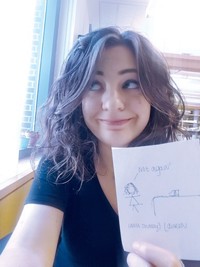Advertisement
Grab your lab coat. Let's get started
Welcome!
Welcome!
Create an account below to get 6 C&EN articles per month, receive newsletters and more - all free.
It seems this is your first time logging in online. Please enter the following information to continue.
As an ACS member you automatically get access to this site. All we need is few more details to create your reading experience.
Not you? Sign in with a different account.
Not you? Sign in with a different account.
ERROR 1
ERROR 1
ERROR 2
ERROR 2
ERROR 2
ERROR 2
ERROR 2
Password and Confirm password must match.
If you have an ACS member number, please enter it here so we can link this account to your membership. (optional)
ERROR 2
ACS values your privacy. By submitting your information, you are gaining access to C&EN and subscribing to our weekly newsletter. We use the information you provide to make your reading experience better, and we will never sell your data to third party members.
Nontraditional Careers
Redefining convention
by Bibiana Campos Seijo
August 5, 2018
| A version of this story appeared in
Volume 96, Issue 32
I was very interested to read Natalie A. LaFranzo’s Comment in C&EN this week. She is the chair of the ACS Younger Chemists Committee, and in her opinion piece she provides her thoughts on the use of terminology such as “nontraditional” when referring to career paths beyond academia or the lab bench.
LaFranzo makes the case that, given the numbers of chemists who now pursue careers outside these traditional paths, terms like nontraditional or nonconventional, which most of us would admit to using regularly, are no longer appropriate.
Indeed, it seems inevitable that more and more chemists will pursue careers outside academia or the lab bench. The risk of such an increase is that it could lead to fewer of us self-identifying as chemists. So what could it mean for the chemical sciences if fewer graduates consider themselves to be “chemists”?
Someone like LaFranzo, who describes herself as having “actively pursued a career at the interface of science and business,” says she still insists on referring to herself as a chemist, albeit one who did not follow the “traditional” path. I am in the same situation: Despite having worked in publishing for most of my professional life, I still describe myself as a chemist.
Unfortunately, LaFranzo and I are in the minority, and fewer of us will likely self-identify as chemists. In turn, this will have an impact in terms of feeling part of a community of like-minded individuals. It could be worse—and LaFranzo alludes to this—with chemists who follow “nontraditional” paths being seen or seeing themselves as “less of a chemist.” That would be catastrophic for chemistry. “Alternative” career paths are in no way a failure or even a deviation—quite the opposite.
Chemists have many skills that are transferable. Chemists are adaptable and will continue to contribute their expertise—no matter in which form—to the chemical enterprise and beyond.
LaFranzo recommends that we educate passionate chemists. It’s hard for young scientists to enter the work marketplace, and classifying chemists as traditional or nontraditional does not help matters. But passion for the field will pull them through.
Interestingly, LaFranzo refers to the chemistry community as a club. This term can be interpreted positively, but for some, it may also have negative connotations.
I’d like to refer you to an article in Wired from July in which Hannah Fry, a mathematics associate professor at University College London, shares her views as part of the recent “Scientists Meet the Media” event at the U.K.’s Royal Society. The article does not use the term “club” but calls for scientists to “ditch tribalism and stop shouting down outsiders.”
She argues that the sheer amount of information—and misinformation—that is available makes it difficult for not just the general public but also scientists to discern fact from fiction. The problem is that scientific consensus can sometimes be indistinguishable from unsubstantiated theory even for scientists, and closing rank on those who disagree—what she describes as tribalism—is simply not the answer. She uses scientific consensus on climate change as an example, and I agree that it is the perfect one to pick. Shouting down dissenting voices has proved to be far from the way forward. In fact, it seems to elicit the opposite response. Although likely to be the long route to a solution, rational discussion is likely to be more effective. It can still be passionate regardless of whether one is a “traditional” chemist.





Join the conversation
Contact the reporter
Submit a Letter to the Editor for publication
Engage with us on Twitter